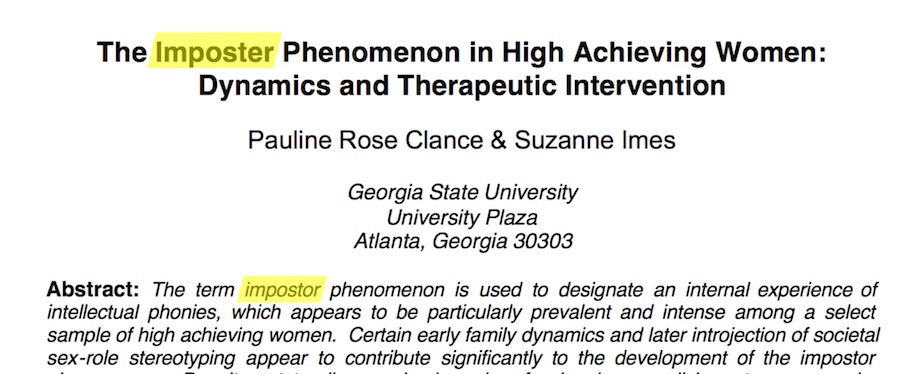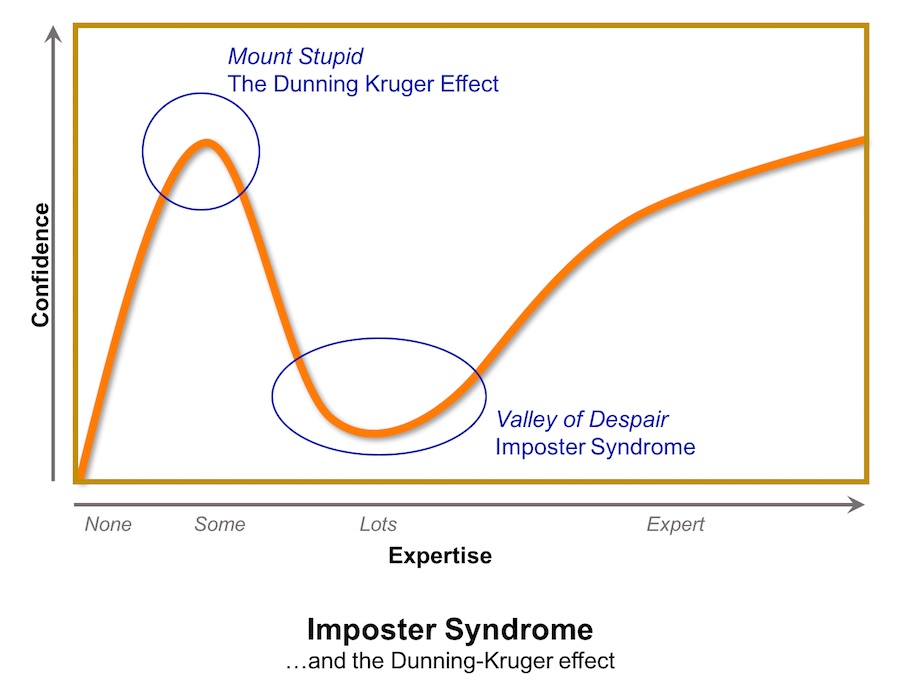
 Who am I to be writing this article? I’m not a psychologist. I don’t know about this stuff. I’m just a hack who reads , reflects, and re-writes. I feel like a fraud… Yup, you guessed it: that’s imposter syndrome.
Who am I to be writing this article? I’m not a psychologist. I don’t know about this stuff. I’m just a hack who reads , reflects, and re-writes. I feel like a fraud… Yup, you guessed it: that’s imposter syndrome.
If you have ever felt inadequate for the task you’ve been given… Or, if you have felt like a fraud among other, better qualified people… chances are you weren’t. What you are feeling is the near-universal effects of what is commonly known as imposter syndrome.
What is Imposter Syndrome?
Imposter syndrome is the name for that feeling we all get at times:
- We feel like we are a bit of a fraud.
- We don’t deserve the success we have.
- Or we don’t fit in with our peer group, because we aren’t worthy to be among them.
Where Does the Idea Come from?
If you scour world literature and drama, you’ll find it in many places. But formally, two psychologists, Suzanne Imes and Pauline Rose Clance first described imposter syndrome in 1978. They called it ‘imposter phenomenon’. Their paper was titled: ‘The Imposter Phenomenon in High Achieving Women: Dynamics and Therapeutic Intervention‘.
They described the phenomenon as a feeling that occurs in high-achievers who find it hard to accept their success. As a result, they attribute their accomplishments to luck rather than to their own ability. Critically, they fear that other people will eventually see through their ‘fraud’ and ‘unmask’ them.
Not a Syndrome at all
The imposter syndrome isn’t a clinical syndrome. It is not listed as an official diagnosis in any psychiatric texts, like the Diagnostic and Statistical Manual of Mental Disorders (DSM). But psychologists are very much aware that it is a real and wide-spread phenomenon. It should concern us when simple self-doubt, which we all feel at times, turns bad. Imposter feelings can grow into anxiety and then lead into stress and, ultimately, depression.
Clance has said, in a couple of interviews, that the term syndrome (which she and Imes never used) is not correct:
In Amy Cuddy‘s book, ‘Presence‘ (US|UK), Clance told the author:
If I could do it all over again, I would call it the impostor experience, because it’s not a syndrome or a complex or a mental illness, it’s something almost everyone experiences.’
Impostor Syndrome or Imposter Syndrome
The original paper by Imes and Clance used the spelling ‘imposter’ in their title, and so do we. Not least because that’s the one Google prefers. And, let’s face it, search is how many of our readers discover our articles. But impostor is not wrong. Not only is it roughly equally prevalent across the articles I found on the web, but my dictionaries tell us that:
- Oxford English Dictionary (2nd Edition, 1991, my authoritative source of word origins): impostor is preferred; imposter is obsolete (!)
- Collins Concise Dictionary (2nd Editioon, 1988, this is my preferred every-day dictionary): impostor and imposter are equally correct
- Bloomsbury Encarta dictionary (2nd Edition, 2004, my source of modern usage): impostor is the listed word; imposter as alternate spelling
- Chambers English Dictionary (7th Edition, 1989, this was pipped at the post for favourite 30 years back!): impostor is the listed word; imposter as alternate spelling
- Fowler’s Modern English Usage (1996 Birchfield Third Edition): Impostor is ‘the recommended spelling, not imposter’
And finally, as I remarked above, Imes and Clarence did, indeed, use the spelling imposter in their title. But take a look at the first page of their paper. They clearly did not want to take a firm stand!

How to Overcome Imposter Syndrome
For most of us, Imposter Syndrome is not debilitating It’s just a nagging feeling of self-doubt. But, even if a little feeling of inadequacy is the worst of it, you’d still prefer to dispel it.
And, if it starts turning to anxiety, you do need to quell it, before that starts to gnaw away at your confidence, and lead to stress.
So, here are my nine top tips for overcoming imposter syndrome.
Awareness Methods
Celebrate your Successes
Nothing beats awareness of why you deserve your place among your peers. And the first way to focus your awareness is to celebrate your successes. This way, you notice each thing you achieve, that contributes to why you have achieved your level of eminence.
Honest Self-evaluation
The next way to raise your awareness is to take some time to evaluate all of the abilities and life assets you have. What do you know and how expert are you? What relationships have you built, and on what are they founded? Include any hugely valuable, yet easy to overlook characteristics like integrity, perseverance, courage, or generosity.
And, while you’re at it, what about an honest evaluation of the people around you. If you want to feel good about your place among them, stop seeing them as some kind of omniscient super-people. Chances are, they are just like you: they have some great abilities and characteristics. But no more than you have.
Inventory of how You Got to where You Are
If you want to increase your awareness of just how much you deserve what you have achieved, how about reviewing what you have done along the way. Maybe make a timeline showing:
- Above the line: what you achieved
- Below the line: the work you put in
Keep a Success Journal
Our final awareness-raising method is, perhaps, the most powerful of all. Keep a Success Journal, or Confidence Journal. Each day, record the successes you have had, and how they came about. Discipline yourself to both:
- Write something every day, and
- Find something, no matter how small, to write about each day
Practical Changes
Find a Mentor, a Coach, or a Good friend
A problem shared… Talking is a brilliant way to ease anxiety. And, if you chose a good listener, you’ll easily find yourself talking yourself out of any absurd self-doubt. A good mentor or friend won’t have any truck with foolish self-deprecation. They’ll soon point out what you really deserve and why.
And, if your imposter syndrome gets out of hand, and starts to become debilitating in any way, talking therapy will still help. You may just need to find a trained counsellor.
Change the Way You Speak
Often, your speech patterns not only betray your self doubt, but they reinforce it too.
- ‘I feel…’
- ‘I think…’
- ‘Maybe…’
- ‘I may be wrong, but…’
When you make a contribution to a conversation, use more confident and assertive language. It will help you believe in what you’re saying, and therefore, in yourself.
You have experience, knowledge, and understanding. So, if you’ve thought something through, your point of view is entirely valid. Yes, of course you could be wrong. But if you weren’t prepared to accept that possibility then, frankly, you’d have a bigger problem than imposter syndrome!.
Reframing your Attitudes
Take a Realistic Approach to Perfection
Okay, first of all: nobody truly is perfect. So the fact that you aren’t does not matter at all, in the context of how you fit in among your colleagues.
And, second, perfection should never be your objective anyway. Wise people know that what matters is to gauge correctly what ‘good enough’ looks like in each situation, and then to meet that standard consistently. Even where perfection is attainable, the cost rarely if ever matches the benefit.
Reframe Imposter Syndrome as Humility
We’ll pick this up in some more detail below. But you know what?maybe feeling some self-doubt is your wise inner voice telling you that:
- you do still have stuff to learn
- you aren’t perfect
- …and you can be wrong sometimes
- other people have equally valid points of view
- …and you need to remain open to them
Imposter Syndrome means You’ve Achieved Something
Lots of highly successful and famous people have reported feeling imposter syndrome. Search the web, and you’ll find best-selling authors, big-name actors, top business-people, and astronauts. Yet they have achieved more than most of us ever will. If you’re feeling like you are an imposter among your peers, maybe it’s a sign that you’re in good company. Perhaps, like all those super-achievers, you too have achieved something truly worthwhile. If you didn’t have imposter syndrome, maybe that would be a sign you hadn’t achieved very much at all!
What if You had the Opposite of Imposter Syndrome?
Expert Syndrome:
The opposite of imposter syndrome is the Dunning-Kruger Effect. This is the false belief that we know more than we do.
Typically, real experts under-estimate their level of expertise; while people with low ability over-estimate it. They succumb to the Dunning-Kruger effect, and mistakenly think they know more than they do. They fail to recognise the huge gaps in their knowledge, or the extent of their incompetence.
Let’s face it, it’s the Dunning-Kruger Effect we should fear. Anyone with a little knowledge, who cannot acknowledge their own limitations, is dangerous.

What is Your experience of Imposter Syndrome?
We’d love to hear your experiences of feeling and overcoming imposter syndrome. Please comment below, and we’ll look forward to reading your thoughts and responding to them.
To learn more…
The Confidence Pocketbook is full of tips, techniques, and tools to help you grow in confidence, grasp life’s challenges and fulfil your ambitions.
The most comprehensive list of ways to overcome Imposter Syndrome that I found, is Kyle Eschenroeder’s list, 21 Proven Ways To Overcome Impostor Syndrome.
